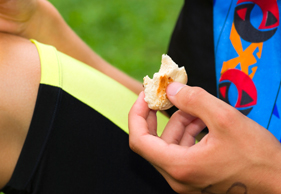Most athletes know that what you eat and drink before and during
training and events will have an effect on performance, but most still ask the
same questions: When and what must I eat? How much should I consume? Is water
good enough or should I use nutritional supplements?.Here are the answers.
FOOD AS FUEL
Many athletes put a lot of emphasis on eating before their event,
believing it is the key element to performance, but what many forget is that
the food eaten throughout the week is just as, if not more important. Consuming
food and fluid before training should be seen as an opportunity to fine-tune
carbohydrate and fluid levels and to ensure you feel comfortable and confident.
Food only becomes useful once it has been digested and absorbed. This
means you need to time your food intake so that the fuel becomes available
during the training session or race, and the time required for digestion
depends on the type and quantity of food consumed – foods higher in fat,
protein and fibre tend to take longer to digest and may increase the risk of
stomach discomfort during training. Therefore, carbohydrate foods are the best.
Just remember that different carbohydrate-rich foods have different effects on
blood glucose levels. Foods with a low glycaemic index (GI) cause a slower,
sustained release of glucose to the blood, whereas foods with a high GI cause a
rapid, short-lived rise in blood glucose. Therefore, low GI foods are
recommended for the pre-training meal.
WHAT AND WHEN TO EAT
It is best to have a meal about three to four hours before exercise,
e.g. baked potato and cottage cheese filling, baked beans on toast, breakfast
cereal with milk, bread roll with cheese/meat filling, fruit salad with
yoghurt, or pasta or rice with a sauce based on low-fat ingredients, or a
lighter snack about one to two hours before training, e.g. liquid meal
supplement, sports or cereal bar, or fruit. It is not always practical to eat a
big meal before your early morning training sessions, so then opt for a light
snack about an hour before training, e.g. a cereal bar or fruit.
LIQUID AS FUEL
Fluid requirements differ markedly between athletes and exercise
situations, and depend on a number of variables. Some people naturally sweat
more than others, and the fitter you are, the quicker you start to sweat, as
well as in larger volumes. On hot, humid days you will sweat a lot more than on
cold winter mornings, and the greater the intensity you train at, the higher
your sweat rate will be.
Most important is that the rate at which you ingest fluids should not be
more than your rate of sweat loss – therefore your weight should not have
increased after your training session. It is easy to estimate your fluid
requirements by weighing yourself before and after
exercise sessions. Each kilogram of weight lost is equal to about one litre of
fluid, and adding the weight of any fluid or food consumed during the session
will provide an estimate of total fluid loss. For example, if you finish a
training session 0.5kg lighter and you consumed 1 litre of fluid during the
session, your total fluid loss during the session was 1.5litres.
Once you know your individual sweat loss rate, you can achieve better
fluid replacement in future training sessions. Where possible, it is better to
begin drinking early in your exercise session or race and adopt a pattern of
drinking small volumes regularly rather than trying to drink large volumes in
one hit.
WATER OR AN ENERGY DRINK?
For all training sessions shorter than one hour, it is ideal to consume
only water, as the body loses mostly water and very few electrolytes in this
period. Electrolytes should be included in fluids (energy drinks) consumed
during exercise lasting longer than one hour, and it is best advised to ingest
carbohydrate, which will rapidly be converted to blood glucose, which will lead
to improved performance.
Andries is a biokineticist at the Technogym Wellness Centre in Fourways,
Johannesburg, lecturer in exercise science, and an Ironman finisher. He
specialises in sport and orthopaedic rehabilitation, and sport-specific testing
and conditioning. See more at www.bio4me.co.za.


